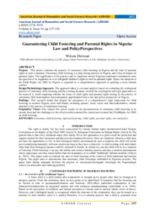Purpose:
This article examines the practice of customary child fostering in Nigeria and the state of parental rights in such a situation. Customary child fostering is a long-lasting practice in Nigeria, and it has an impact on parental rights. The significance of the practice and its impacts in mostly Nigerian traditional communities raise the question of its regulation so as to safeguard children's rights as well as parental rights. Hence the adoption of the Child Rights Act 2003 by Nigeria is regarded as a comprehensive approach to quelling a socio-cultural conflict.
Design/Methodology/Approach:
The approach taken is a textual analysis based on evaluating the widespread practice of customary child fostering and the existing literature on both the sociological and legal approaches to the issues.It is worth enquiring whether the issues of child rights and parental rights arising in the practice of customary child fostering have been adequately apprehended from a law and policy perspective in Nigeria.
Findings:
This research found that despite the emergence of a comprehensive legal framework for child fostering in modern Nigeria, most individuals, including parents, foster carers and other stakeholders, remain attached to the practice of traditional fostering.
Originality/ Values:
The value of this article resides in the deconstruction of customary child fostering in its current form and the challenges to the effective enforcement of the current provisions of the Child Rights Act 2003 on child fostering.

